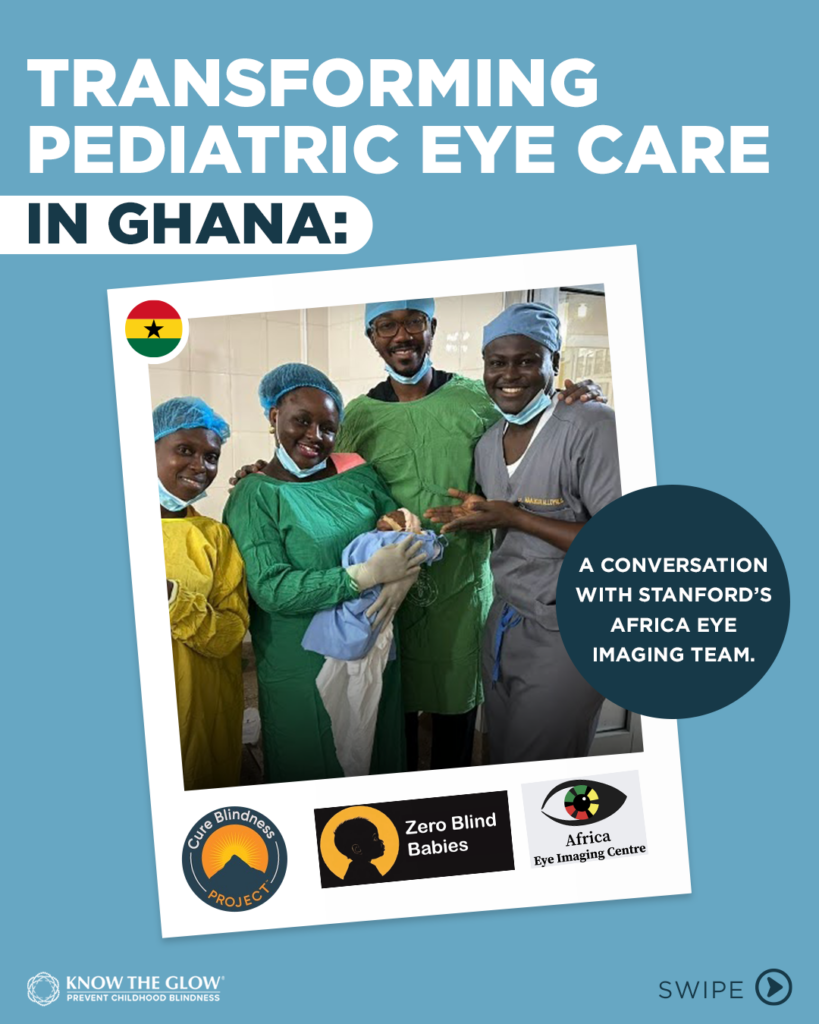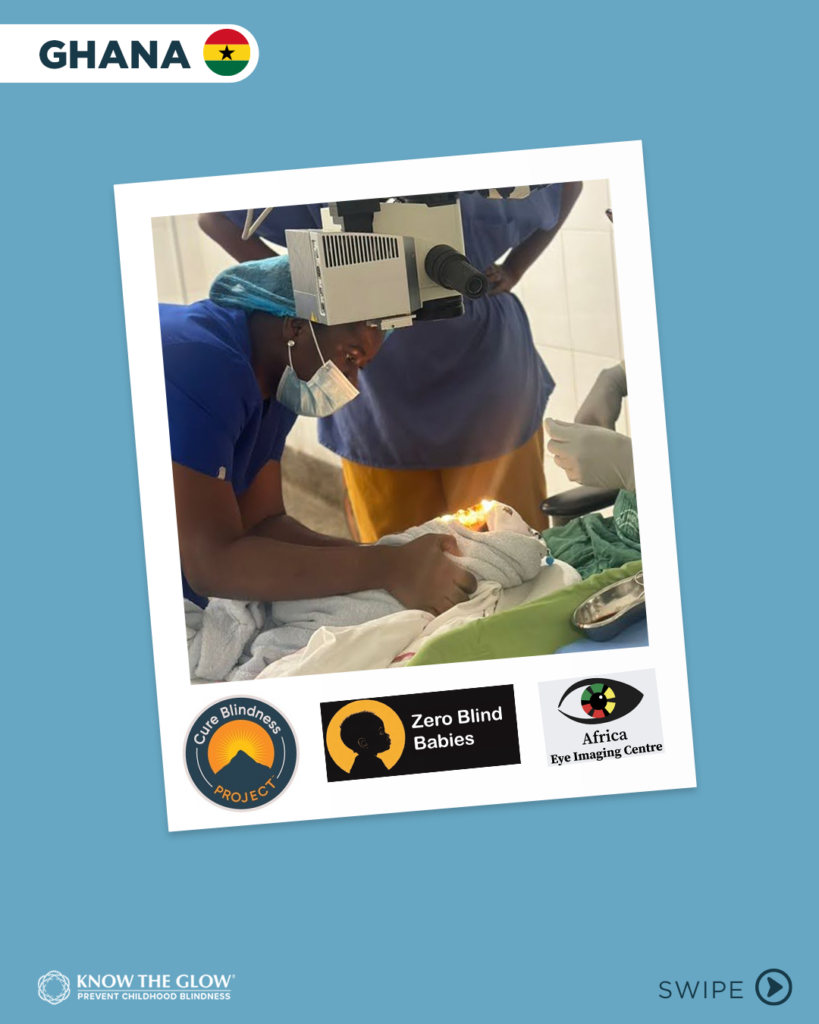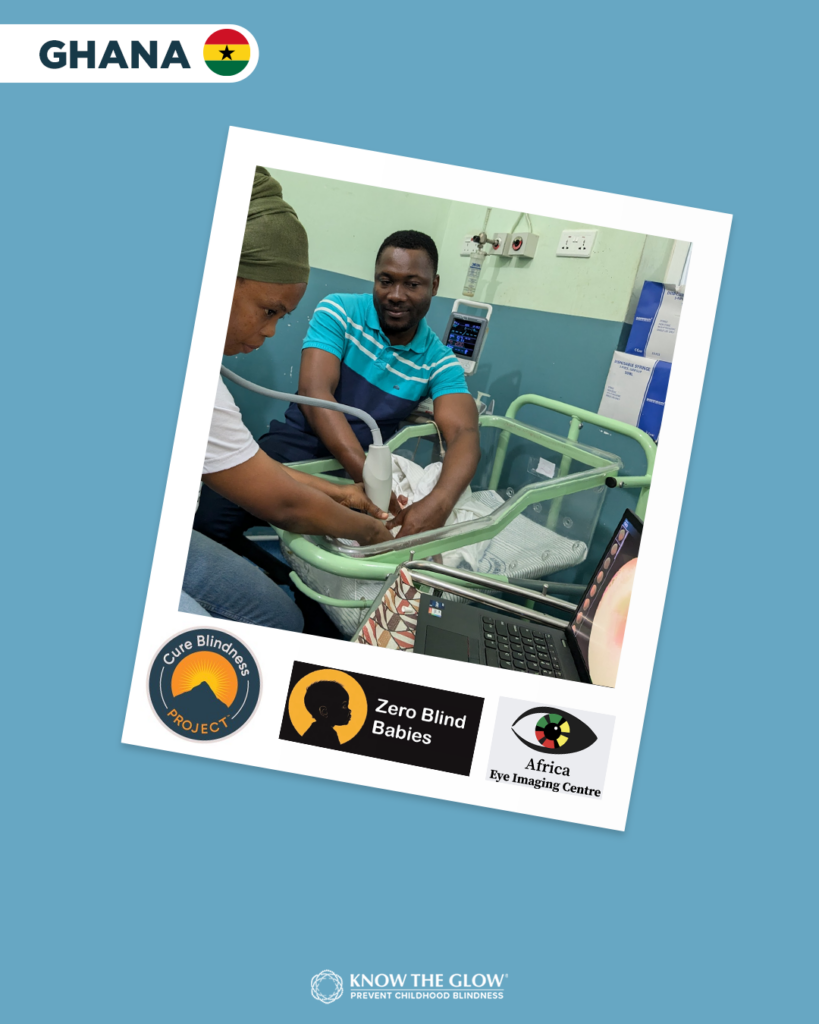At KnowTheGlow, we are committed to finding children at risk of preventable blindness. Few conversations have embodied this mission more than our recent exchange with Drs. Arthur Brant, Sarthak Shah, and Andrew DesLauriers. Zero Blind Babies, their 501(c)3 nonprofit, in collaboration with Africa Eye Imaging Center led by vitreoretinal surgeon Dr Akwasi Ahmed, Cure Blindness Project, and Stanford researchers, is pioneering a groundbreaking model for the early diagnosis of pediatric eye disease in Ghana. Their work is not only saving sight, but also building a new standard of sustainable and scalable care across Sub-Saharan Africa.
The conversation began with Retinopathy of Prematurity (ROP), a disease that, while relatively rare, is devastating when left undiagnosed and untreated. Prior to starting this initiative in 2024, a needs assessment led by Stanford Resident Dr. Jessica Sedhom revealed that only one out of 229 NICUs in Ghana had ROP screening in place. Dr. Brant explained that all babies in the 228 remaining NICUs that went on to develop treatment warranted disease unfortunately went undetected, untreated, and left to face a life without vision. “It’s especially heartbreaking,” he said, “because blindness from ROP is preventable, and has one of the most cost-effective interventions in all of ophthalmology— Just $60 USD for a treatment that takes two minutes can save a child’s vision for life.”
Yet, the challenge isn’t treatment, it’s early detection through screening. ROP affects premature babies exposed to oxygen, and classically manifests within a narrow 10-week window after birth. Screening requires catching these babies in time and examining them week after week. With appropriate screening and timely treatment, lifelong blindness can be prevented in virtually every at risk infant. However, if a baby isn’t screened and treated in the acute phase window and develops retinal detachments, restoring vision is nearly impossible.
The solution for Zero Blind Babies was to train community health workers – many of whom had never stepped into a neonatal intensive care unit before – to photograph infant eyes safely and accurately using a pediatric retinal camera built by Forus Health. The Bangalore-based company is helping reduce costs without sacrificing quality. The team currently uses a device called the 3nethra Neo, which provides similar image quality as the gold-standard RetCam, but for a fraction of the cost. The images are graded remotely by local retina specialists who ultimately decide clinical management. Notably, their unique model also enables the sharing of de-identified images with quaternary international experts in ROP. This provides the opportunity for local doctors with limited prior experience in ROP to learn from expert grades on the same images. Over time, the goal is to build capacity and ROP expertise in local Ghanaian physicians. Treatment is supervised by experienced vitreoretinal surgeon, Dr Akwasi Ahmed.
Sarthak Shah noted that the program has already established three main treatment centers in Ghana’s largest cities, each capable of taking referrals from surrounding hospitals. A key component of the model is ensuring that each regional hub has dedicated community health workers for photography in addition to a local champion physician who can either already perform ROP treatment or be trained to do so, allowing care to remain local while still meeting a high standard.
This model is centered around affordability and sustainability. Instead of placing an expensive pediatric retinal camera in every NICU, the team assigns one camera per region. Major teaching hospitals act as centralized screening hubs, taking responsibility for both inpatients and referrals from surrounding facilities. It’s working — in their first center established in the Ashanti Region surrounding Kumasi, they estimate that they’re now able to prevent 90+ percent of the ROP-related blindness across all NICUs in the region.
Perhaps most exciting is how this infrastructure could support the early diagnosis of another devastating pediatric disease: retinoblastoma. “If our model works for ROP,” Dr. Brant said, “we can leverage the same cameras to photograph retinoblastoma patients and monitor and track tumor size helping to guide treatment.”
The technology and access to cutting edge treatment modalities is already present in Ghana, but what’s missing is specialized training. Retinoblastoma exists in every corner of the world, however, many regions lack access to fellowship trained ocular oncologists. Lack of formal training in pediatric retinal disorders leads to the risk of misdiagnosis or delayed care. The team envisions a future where every ROP site also serves as a retinoblastoma diagnostic hub, with images reviewed by international experts.
Dr. DesLauriers, who spent eight months in Ghana and is now a Ophthalmology resident at Stanford, underscored the value of telemedicine for long-term mentorship. “In places without senior mentors,” he said, “remote collaboration could become a vital component of future fellowships in retina or ocular oncology.”
The Zero Blind Babies approach of training local health workers, streamlining care through regional hubs, and connecting global experts using technology is not just a short-term fix. It is a long-term strategy that allows countries like Ghana to build internal capacity and take ownership of their pediatric eye care systems.
Local champions (Drs. Akwasi Ahmed, Naana Wireko Brobbey) are poised to keep advancing the program, with support from leading faculty experts at Stanford University (Drs. Darius Moshfeghi, Geoffry Tabin, Scott Lambert, and Prithvi Mruthyunjaya). Momentum is building. With the program’s success in Ghana’s three major cities and formalization of partnerships with the Ministry of Health, the model is firmly taking root with plans to scale to major population centers across Sub-Saharan Africa.
At KnowTheGlow, we’re honored to support and amplify this work. As our own awareness campaign runs in Ghana, we’re exploring ways to co-brand educational tools, support outreach to NICU families, and collaborate on efforts to make vision care accessible for Ghana’s most vulnerable patients.
This conversation reminded us that technology is only part of the solution. What truly drives progress is collaboration, shared vision, and the belief that every child, regardless of where they’re born, deserves the chance to see.



